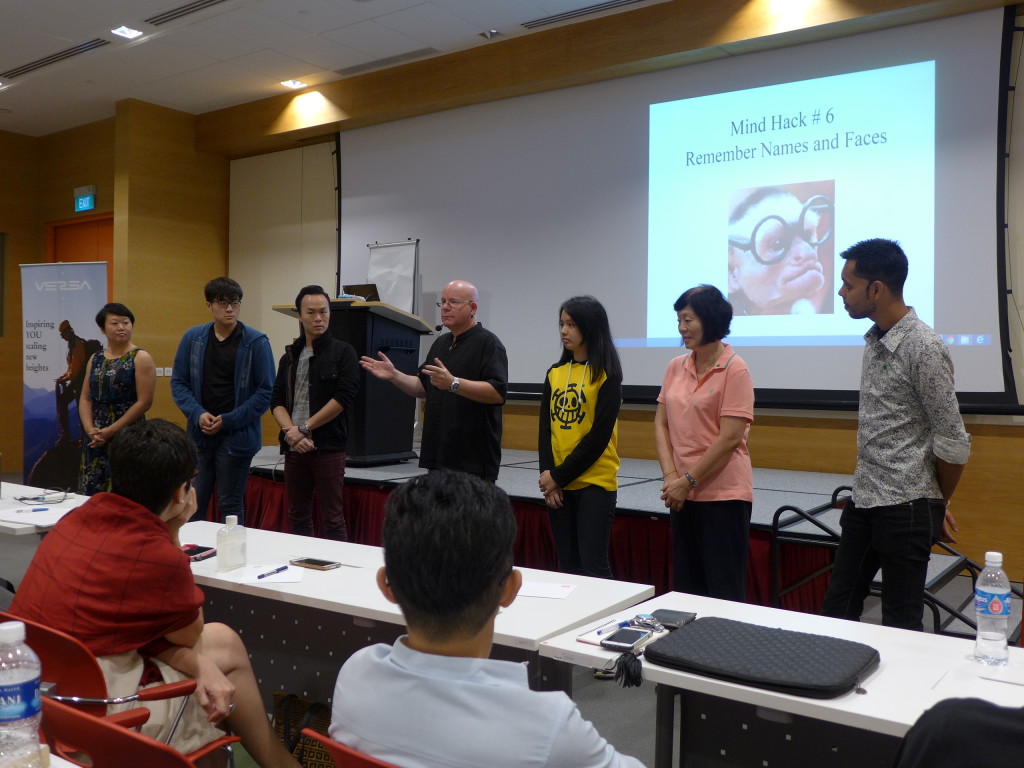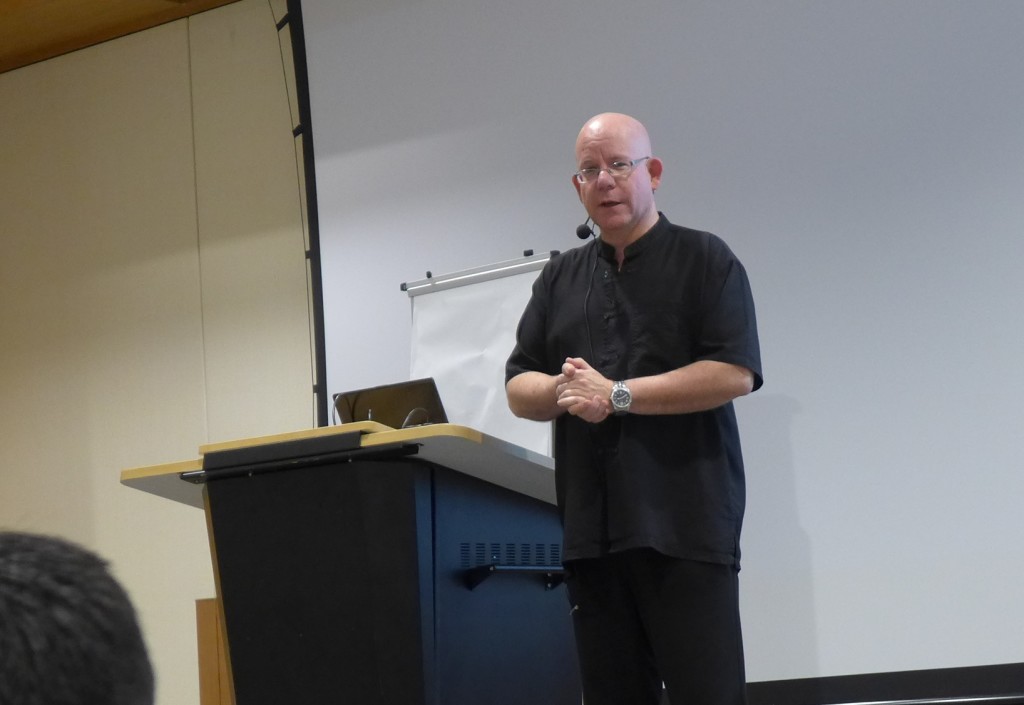The human mind is one of the most brilliant creations on Earth. There isn’t a computer invented by man that can rival what happens between his ears.
Unfortunately, our minds are vulnerable to various quirks and idiosyncrasies which makes us prone to errors. Don’t believe me? Just look at the examples highlighted by Dan Ariely in Predictably Irrational.
Are there “mind hacks” to prevent us from making silly mistakes? Can we improve the way we make decisions – both big and small?
Eran Katz – a mind hacking guru
Thanks to a recent Mind Hacking Workshop by Guiness Book of Records holder Eran Katz, I now know how.
Stalwart of the world’s Best Memory Stunt (he recited 500 numbers forward and backwards after hearing them once), Eran Katz is the international best-selling author of books like “Secrets of a Super Memory” and “Where did Noah Park the Ark”. A self-styled expert in intelligence and memory, Eran spent an afternoon here in Singapore conducting two mind hacking mini marathons working with Versa Creations.
Here’s a photo of Eran teaching us how we can better remember names and faces. Apparently, there are a couple of ways to do so:
- Pinocchio’s Method, ie associating a person’s unique facial features with his name and face;
- Napoleon’s Method, ie visualize “writing” the person’s name on his forehead; and
- Repeating the person’s name after he or she has introduced himself, and find ways to use it actively during your first conversation.

Hall of shame – famous mistakes and errors
Have you heard of baseball player Yogi Berra? Well, he was famous not only for being a great baseball player, but for being the most quoted sports figure in history.
Unfortunately, many of his quotes may sound wise but are actually quite something else. Here are some examples:
“I knew I was going to take the wrong train, so I left early.” – Yogi Berra
“Think! How the hell are you gonna think and hit at the same time?” – Yogi Berra
“You can observe a lot just by watching.” – Yogi Berra
(You can find more hilarious examples here.)
Despite his mistakes, many people still quoted him regularly. They regard him as an oracle – a guru of sorts – and fall prey to what is known as authority bias.
Yogi’s infamous quotes are an example of what Eran called wrong mistakes. These are mistakes which are made despite being illogical. Often they are a result of our cognitive biases (read my blog post featuring Rolf Dobelli’s book The Art of Thinking Clearly).
The counterpoint to these are right mistakes, ie those first time errors that are made in pursuit of a known objective. These genuine mistakes are free from such thinking errors.
Two other examples of famous failures:
- The universal acceptance of the far less efficient QWERTY keyboard (compared to the 40% more efficient Dvorak simplified keyboard) due to our reluctance to change our old habits. As modern keyboards no longer have the problem of typewriter keys getting stuck, the original rationale for the QWERTY keyboard no longer existed.
- The loss of US$1.5 million by gamblers at a Casino in 1913. These roulette players felt that the ball on a roulette table would land on a different colour. Unfortunately, it persisted in landing on the colour black 23 times in a row!
Stock market predictions and doomsday cults
As the Great Financial Crisis revealed, our stock markets are littered with the metaphorical remains of folks who naively believed everything “experts” said. Like the gamblers in Las Vegas, they imagined that their past experiences would inform future decisions.
Check out this list of the top 10 hilariously wrong stock market predictions. Take a look at what Nobel Prize winning economist Paul Krugman predicted about the Internet way back in 1988:
“As the rate of technological change in computing slows, the number of jobs for IT specialists will decelerate, then actually turn down; ten years from now, the phrase information economy will sound silly.” – Paul Krugman (1988)
Known as cognitive dissonance, this psychological phenomena of “going with the flow” even when something is obviously wrong is exemplified by this quirky story taken from NPR.
In the 1950s, social psychologist Leon Festinger studied a group of cultists called “The Seekers” who followed a lady known as Marian Keech. They imagined that the world would end on 21 December 1956, and that the faithful would be picked up in a flying saucer and brought to safety on 20 December midnight.
Many of her followers quit their jobs and sold everything to wait for the fateful day and time. Others, however, just waited in fear or resignation at home.
(Mrs Keech’s husband, a nonbeliever, went to bed early as usual and slept through the night!)
Well as we all know, the world didn’t end that night. What’s interesting though was that those who sold their worldly belongings and waited for the alien interplanetary crafts actually deepened in their belief of Mrs Keech’s mystical abilities!
Ways to prevent mistakes and improve decision making
Now that we have read the horrors of cognitive biases, what can we do to navigate a world full of obstacles and mistakes?
Here are some rules to consider.
#1 Never make decisions at night
Use the “Am I fit to drive?” guideline to decide if you should make a decision. If we feel angry, irritable, tired, or harassed, we should stop ourselves from committing to an important decision. Never make a critical decision just before we go to bed.
#2 Avoid distractions and focus
We live in a world overloaded with information. Just scrolling through our Facebook feeds alone can take forever.
When making an important decision, however, we should focus on the task at hand and minimise all distractions.
#3 Limit your available options
The best decisions are made when we make the effort to whittle down the available choices. Crunch, digest and splice the information such that we can reduce them to at most three to four quality variables. Spend at least a few minutes focusing on the decision and thinking it through.
#4 Use your intuition only if you know the subject
With the three or four variables mentioned above, we should use our intuition only if we are familiar with the topic. For example, real estate agents should only use their intuition to value houses and not artworks.
Similarly, footballers can only make split decisions on the football field and not the battlefield.
Note that if you are making decisions in an unfamiliar area, you should devote more time to doing it.
#5 Heart over logic (should both conflict)
When the heart and logic conflict, choose your heart. This is where intuition comes in.
#6 Logical measurement over intuition (should information be available)
Should logical measures be available, however, we should rely on them to make our decisions instead of using our intuition.
#7 Don’t trust even the most revered oracle in the world
As Eran’s examples have shown, everybody – gurus, experts, consultants, and advisors – will regularly make mistakes. Only trust information which you have sought, studied and pondered over by yourself.
#8 Be humble and stay modest
Often, wrong decisions are made by people who have allowed their egos to override their logic. Don’t allow that to happen to you.
#9 Be patient and avoid rashness
Finally, do not make snap decisions at the heat of the moment. Avoid giving in to instant gratification (read my blog post on delayed gratification and self control).
What other mind hacks can we put in place to avoid errors in decision making? How can we implement the above strategies in our daily lives?
For more information, do consider grabbing a copy of Eran Katz’s bestselling books or look out for his next workshop in your city.

